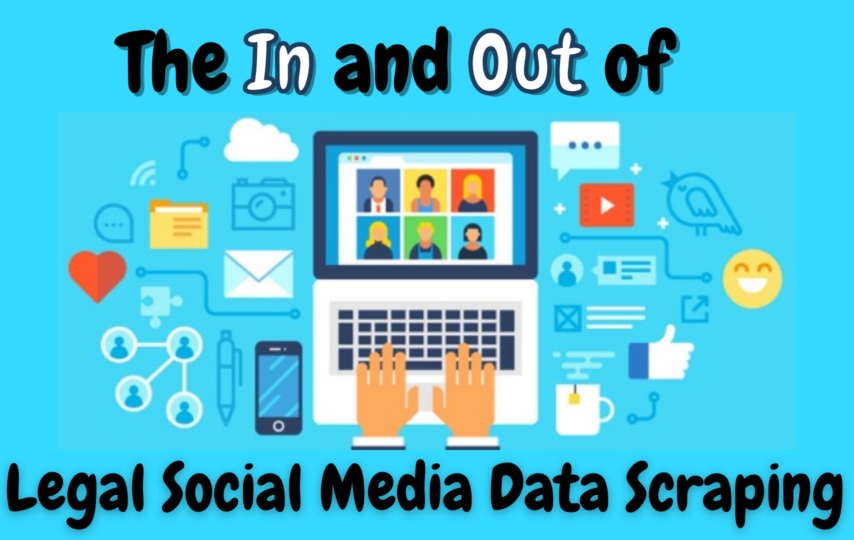Social media platforms are data hotspots and can be used for a great deal of research, marketing, sales, and communication purposes. They are especially useful because they possess critical information about individuals. With a focused approach, businesses can easily glean behavioral trends, decision-making determinants, and consumer opinions from social media platforms. This data can then be studied to drive personalized campaigns and improve business outreach, sales, etc.
However, there is a huge catch with social media data scraping, i.e., is it legal?
There is a lot more to be understood about this particular data collection methodology. But concerns around its legality take center stage. So, here is a quick overview of what data scraping on social media looks like, how to handle its legal constraints, and what data types can be found on these platforms. We’ll also discuss how you can increase the efficiency of this process through assistance from external social media data entry services.
Is social media data scraping legal?
It is a common misconception that extracting data from the web is not a legal practice. In reality, it is illegal to scrape or use private data. However, any data available in the public domain is fair game.
So, data available on public profiles or feeds, data about likes, comments, and followers, or data around posts are legal to scrape. Only private profiles are off-limits.
Types of data that can be collected from top social networks
A business needs to know which type of data is available on which platform and if it’s relevant to your purpose to save time and effort.
1. Twitter
- List of all Tweets
- Complete profile information (name, DOB, followers/following, account creation date, etc.) if their profile is public
- Hashtags location
- Brand-specific hashtags
2. Facebook
- Type of content being liked
- Username patterns
- Profile URL
- Followers & following information
- Profile photo URL
- Locations of different posts
- Number of likes, comments, views, etc. on their content
- Information from comments & text-based posts
3. Instagram
- Date & frequency of posts
- Number of likes & comments
- Media & post URL
- Number of followers & following
- External URLs being mentioned anywhere on the profile
Top Social Media Data Scraping Challenges
LinkedIn is a good case study of how social media companies stand in favor of banning web scraping on their platforms. It swayed many other websites to reconsider their individual web scraping guidelines. While LinkedIn’s request to completely discredit all web scraping attempts on its platform was thwarted by the court, it has still created a new set of challenges for companies relying on web scraping to gather customer data.
- Frequent page structure changes can break a data scraper/crawler
- Social media platforms are identifying and blocking bot behavior
- Managing data scraping needs that scale quickly (from hundreds of pages to millions) consumes a lot of resources if you rely on any data scraping tool
On top of these scraping challenges, you have to deal with data management issues. Even if such data is critical, it doesn’t come in a stable shape. It needs handling, cleaning, and processing to glean more insights. So, if you need quick results but also can not compromise on quality, it would be better to look for external data scraping companies or social media data entry services.
Is Outsourcing Social Media Data Scraping Services a Smart Choice?
Outsourcing data scraping services is a smart choice, be it by the parameter of cost-effectiveness, quality of data, access to expertise, or excellence of outcomes.
That’s because not every company has the capacity to operate an in-house team, or even if they have the budget, they might still be unaware of how to do it properly. Below are a few primary reasons that make outsourcing a smart choice:
1. Uninterrupted Data Flow:
Every outsourcing agency is afraid of losing clients, and this benefits their clients in terms of uninterrupted service flow. Outsourcing social media data-scraping services will give you an upper hand compared to in-house teams. From an outsourcing agency, you can ask for the data as frequently and as consistently as your business needs it.
2. Better Infrastructure Access:
Setting up an in-house team will require manpower preparation and business tools. A slight mistake in either one of these and the result will be poor efficiency & hampered effectiveness. Also, a large volume of data scraping will require further custom scripts & specific software, which aren’t readily available or inexpensive, whereas all these facilities are available at any good outsourcing agency.
3. Highly Experienced Data Crawlers:
Hiring scraper or crawler developers in-house will involve training before they can deliver quality work, whereas outsourcing companies are already equipped with professionals. They can also provide many other means of data extraction, like scripts, APIs, manual data collection, etc.
4. Core Focus Remains Intact:
Having an in-house team will result in time wastage, divided focus, and at the same time, will require separate management to look after new employees and the quality of work. When outsourcing your data scraping work, you outsource almost everything related to this work. This way, you can continue giving your time and focus to the primary goals of the business.
5. Highly Cost Effective:
In-house employees will draw the same monthly salary, irrespective of workflow and requirements. Outsourcing agencies charge on an hourly basis, on a contract basis, and the volume of data. You can even pause or resume their service as per your needs. Hence saving a tremendous amount of money.
Conclusion
Social media data scraping is undoubtedly a powerful and smart method to fuel sales and marketing strategies with customer-specific data. But, implementing it is a matter of understanding the legal concerns, the relevance of data types, and the most efficient methodologies for your particular goals.
Whether you hire an in-house team or outsource web scraping or social media data entry services, make sure that the scraped data is of high quality and relevant. Avoid storing any illegal data. Data legality is different for every country, and a few regions, like Europe, Russia, China, etc., have framed highly specific data protection policies and compliances with huge fines for violating those. So, approach social media data scraping with care and caution.








